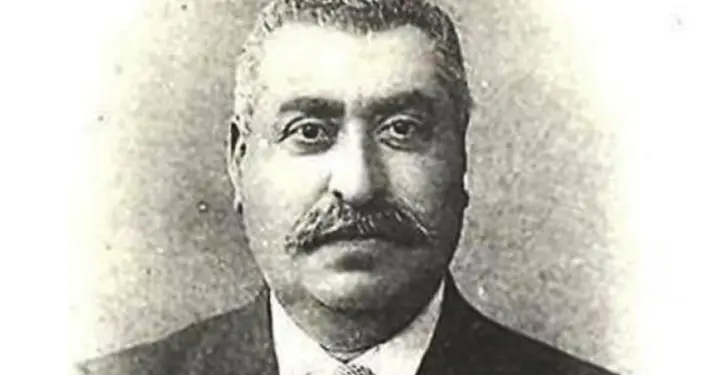DEATH OF ALEXANDER MANTASHIANTS
April 19, 1911

Alexander Mantashiants was a prominent oil magnate of Baku who was also well known for his philanthropy.
Born in Tiflis on March 3, 1842, Mantashiants spent most of his childhood in Tabriz (northern Iran), where his father was involved in the cotton and textile trade. From early on, he joined his father in business. In 1869, he moved to Manchester, a major textile center, from where he helped ship goods to his father in Tabriz. His sojourn helped him learn the secrets and crafts of the textile industry, as well as the intricacies of European business and English culture, while he learned English, French, and German.
In 1872, Mantashiants returned to Tiflis with his father, where they became fully engaged in the wholesale textile trade. After his father’s death in 1887, he purchased most of the shares of the Tiflis Central Commercial Bank, becoming its principal shareholder and then chairman of the board. The bank was involved in almost every aspect of trade in the Caucasus.
In the early 1890s, when Mantashiants was already a Speaker of the Tiflis Duma, he became interested in the prospects of Baku oil and bought unprofitable oil wells in Baku that soon became profitable. He built a kerosene plant, as well as a lubricant plant and a marine refinery for pumping oil and fuel into vessels in Baku. His company owned a factory for the fabrication of canisters for the packaging and storage of oil in Batum, a mechanical workshop in Zabrat, an oil pumping station in Odessa, and even one hundred freight cars circulating in the southwestern railways of Russia. In 1899, he created the trading house “A.I. Mantashev and Co.,” opening representative offices and warehouses in the major cities of Europe and Asia. He became a shareholder in a number of oil companies. By 1904, it was the third largest oil company in Baku after the Nobel Brothers and the Caspian Sea Society of the Rothschild brothers.
Mantashiants funded the Baku-Batum pipeline, which was launched in 1907, becoming the world’s longest pipeline (835 kilometers). His company was the largest in Russian industry by volume of fixed capital between 1899 and 1909.
His earliest charitable endeavor was to contribute to the construction of the Holy Trinity Armenian Church of Manchester in 1870. Along with twelve like-minded people, he founded the Armenian Benevolent Society of the Caucasus in 1881. His most famous act of philanthropy came in 1904, when he spent 1,540,000 francs to construct the Armenian Church of St. John the Baptist in Paris, the only Armenian church in the French capital to this day. For this magnanimous gift, the President of France awarded him the Order of the Legion of Honor. A patron of the arts, he had a personal lounge in the Académie Nationale de Musique of Paris. In Tiflis, he built the Pitoewski Theatre (rebuilt by the Soviets and now known as the Rustaveli Theatre).
He donated 300,000 rubles towards the building of the Nersesian School in Tiflis and 250,000 rubles for the construction of the residence of the Catholicos in Holy Etchmiadzin. He sent over two hundred young Armenians to study at the best universities of Russia and Europe, such as musicologist Gomidas Vartabed, linguist Hrachia Adjarian, philologist Manuk Abeghian, and many others.
Mantashshiants died on April 19, 1911, in Saint Petersburg. He was buried next to his wife at the cemetery of Vank Cathedral, which, along with the cathedral itself, was destroyed in 1933. His company ceased to exist after the October Revolution of 1917. A street in Yerevan and a monument remember him.
